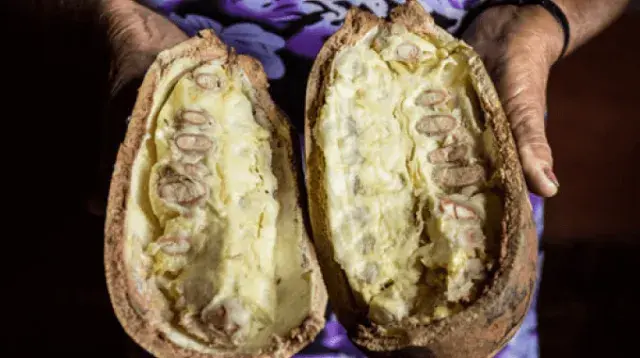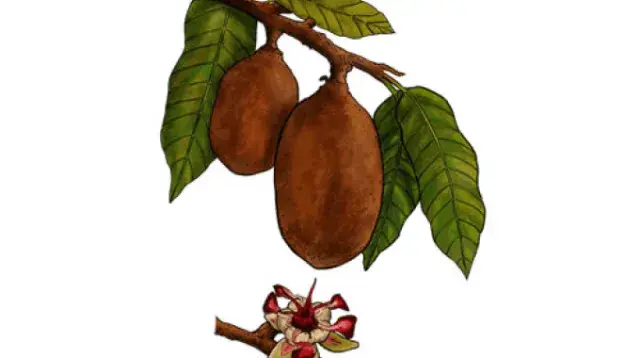Cupuacu: the fruit telling us how to live with the forest
Protecting the Amazon from deforestation thanks to a fruit, the cupuacu.
Big changes for the Amazon rainforest
Transferring knowledge from one community to the other
Imagine two communities: one that has been taking care of the forest for 8 years and has found how to live sustainably, the other, more novice, recently got a right to the land and is new to any kind of farming. And if those who became experts to protect the trees accompanied the second in the change?
The first is the Santa Luzia community. Its members have chosen to share the sustainable practices they have with the Bela Aurora community to help them seize the opportunities of their right to the land in an ecofriendly way.
Setting a new agroforestry system
People in the Santa Luzia community have learnt how to live in harmony with the forest. Instead of destroying it, they know how to protect it in order to live from its resources. By following the principles of agroforesery, they turned it into a sustainable source of both food and income.
It yields wood of course, but also fruit. While cupuacu has a key role, other fruits allow the community to diversify their meals and their economy: passion fruit, cocoa, acai, banana, mango, acerola, guava...
The Bela Aurora community has now access to this specific expertise through members of the Santa Luzia community and is on its way to successfully managing to live out of the forest on an agroforestry system, while reforesting at the same time.
Planting new trees
It takes trees to set up any kind of farming according to agroforestry principles! Hence the first side of our mission there, which is to help replanting trees. Together with a local NOGO, Instituto Beraca, we are bringing our support to plant 3000 young trees, including cupuacu trees, so that the land spoiled by deforestation, monoculture and farming can get a second chance.
A nursery was created within the Bela Aurora community in order to grow cupuacu trees. This is also becoming a place where knowledge that is key to making the transformation sustainable in the long term is being transferred within the community itself.
View the video "Cupuacu : protect"
Bela Aurora, a village looking for its path
For the 46 families of Bela Aurora, it’s all about finding a new balance. The village is a Quilombola community: they are descended from slaves and have long been marginalized. The inhabitants are used to living out of social welfare and subsistence… It’s only in 2005 that were granted land rights!

Cupuacu is truly versatile
The flesh of this brown fruit is sour, cream colored and very fragrant. With the flesh, the grains and the shell, it offers everything to make butter, desserts, ice-creams, juices…and even objects such as pots or containers.
Thanks to its exceptional nutritional and hydrating properties, cupuacu butter is also often used in cosmetics.

Theobroma grandiflorum
(Family: Sterculiaceae)
Here is a little tree with brown bark and purple-pink leaves. It comes from the Amazon and means “large + similar to cocoa” in Tupi (tupian language). Indeed, it belongs to the same family as cocoa and often replaces it in Brazil.
View the video "Cupuacu : botanical focus"
What is agroforestry?
It is an activity that combines agricultural crops and/or pasture with long term production by trees and perennials (shrubs, palms…), in order to create more diverse and sustainable land-use systems.
Testimonies matter
Proving the positive results
Since it all works, better document it right? We have chosen to analyze the benefits of cupuacu farming with agroforestry in order to be able to clarify its mechanisms and prove the truly positive impact of such practices.
There is nothing better than experiment and the figures that come with it to convince those still hesitating to follow this path!
We are leading a solid study on site through a partnership with a socioecologist from the Federal University of Para in Belem.
View the video "Cupuacu : explore"
Passing the knowledge onto the kids
Tomorrow, they will be the ones in charge of protecting the forest. For the next generation to fulfill its task, we need to raise awareness among the children first. They have to understand that the resources in the forest are not bottomless, that its wealth is huge but fragile, that man can either hurt it or protect it…
To share this awareness about nature and ensure it gets to the next generations, we support programs in the local schools, in coordination with the teachers.
View the video "Cupuacu : share"
Klorane Botanical Foundation & Instituto Beraca
We have partnered with Instituto Bereca on this project. The institute is a renowned figure of biodiversity conservation in Brazil. It has developed a large number of projects on environmental care, social responsibility, wealth distribution…
UNESCO Green Citizens, become a pathfinder for a change
The project was chosen by the UNESCO as an emblematic example of Education for Sustainable Development along with ten other stories throughout the world.

